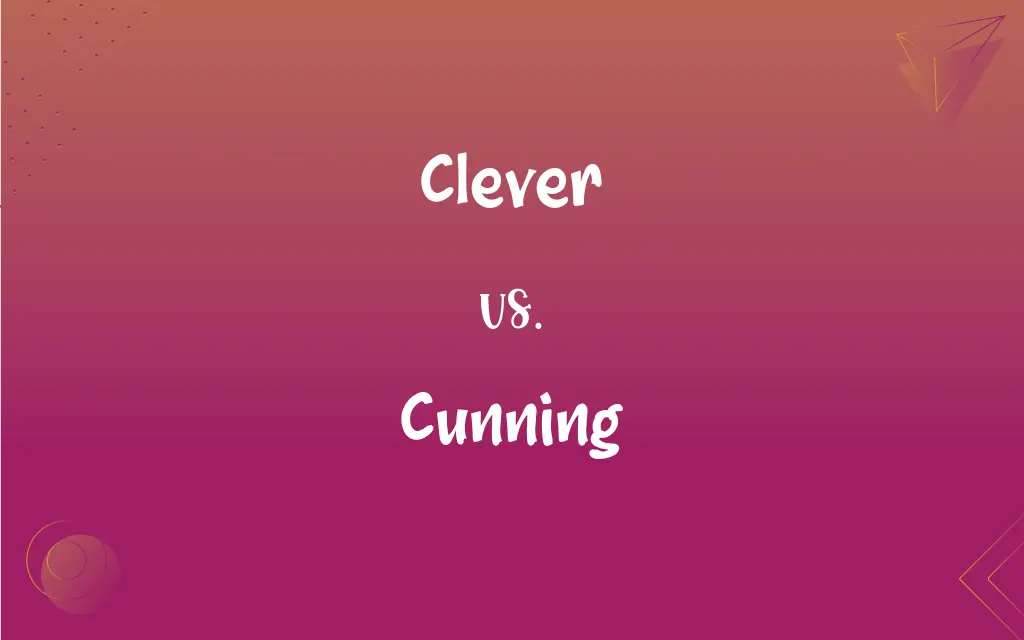Clever vs. Cunning: What's the Difference?
Edited by Aimie Carlson || By Janet White || Published on December 29, 2023
"Clever" implies resourcefulness and quick-thinking, often positively; "Cunning" suggests shrewdness with a deceitful or manipulative connotation.

Key Differences
Cleverness is associated with intelligence and the ability to solve problems quickly and creatively. Cunning, on the other hand, often implies a similar level of intelligence but used for deceitful or manipulative purposes.
In literature, a clever character is admired for their resourcefulness and wit. Conversely, a cunning character may be viewed suspiciously, as their intelligence is used for self-serving or dubious ends.
In everyday language, calling someone clever usually denotes respect for their mental agility. Calling someone cunning, however, often carries an undertone of mistrust, highlighting their capability for deception.
Educational contexts tend to foster and praise cleverness for its role in learning and innovation. Cunning, conversely, is typically discouraged due to its association with cheating or unethical behavior.
In problem-solving, being clever is about finding innovative solutions. Being cunning, in contrast, might involve bending rules or manipulating situations to one's advantage.
ADVERTISEMENT
Comparison Chart
Connotation
Positive; admired intelligence
Negative; deceitful intelligence
Usage in Literature
Heroic, resourceful characters
Sly, manipulative characters
Context in Conversation
Complimenting intelligence
Implying deceit or manipulation
In Problem Solving
Innovative solutions
Manipulative strategies
Educational Viewpoint
Encouraged for learning
Discouraged due to ethics
ADVERTISEMENT
Clever and Cunning Definitions
Clever
Characterized by wit and ingenuity.
She made a clever remark that amused everyone.
Cunning
Skillful in deception or trickery.
The cunning fox outwitted the hunter.
Clever
Intellectually quick and resourceful.
She was clever enough to solve the puzzle in seconds.
Cunning
Cleverly achieving one's aims by indirect or deceitful methods.
He used a cunning strategy to win the game.
Clever
Showing inventiveness or originality.
Her clever invention won the science fair.
Cunning
Showing sly intelligence, especially in deceit.
Her cunning plan secured her the deal.
Clever
Apt at learning or understanding things.
He's clever with languages and speaks three fluently.
Cunning
Artfully subtle or shrewd.
His cunning eyes missed nothing.
Clever
Skilled at doing or achieving something; talented.
He's clever at mathematics.
Cunning
Ingeniously deceitful.
The spy used his cunning nature to gather information.
Clever
Mentally quick and original; bright
A clever student.
Cunning
Marked by or given to artful subtlety and deceptiveness.
Cunning
Executed with or exhibiting ingenuity.
FAQs
Can "cunning" have a positive connotation?
Rarely; it's usually associated with deceit.
Can a solution be both clever and cunning?
Yes, if it's ingenious and manipulative.
Is "clever" always a compliment?
Yes, it typically praises someone's intelligence or skill.
Do children's stories often feature cunning characters?
Yes, often as antagonists or tricky figures.
Are animals described as cunning?
Yes, especially when they're seen as sly or deceptive.
Are clever people always cunning?
No, cleverness doesn't imply deceit.
Is cunning a form of intelligence?
Yes, but it's often intelligence used unethically.
Is being clever valued in education?
Absolutely, as it relates to learning and problem-solving.
Can "cunning" be a trait of a hero?
Rarely; it's more common in villains.
Is being cunning illegal?
Not necessarily, but it can involve unethical behavior.
Can machines or technology be clever?
Yes, in the sense of being well-designed or efficient.
Do synonyms for "clever" carry the same positivity?
Generally, yes, like "smart" or "intelligent".
Can businesses operate cunningly?
Yes, but this can lead to ethical dilemmas.
Is cunning a survival skill?
In some contexts, it can be seen as such.
Is it better to be clever or cunning?
Generally, being clever is more positively regarded.
Can one become more clever?
Yes, through learning and experience.
Does "clever" imply creativity?
Often, as it involves thinking in new ways.
Are all cunning acts unethical?
Not all, but many involve questionable ethics.
Can "cunning" be used in a playful sense?
Sometimes, in a light-hearted or teasing context.
Are "cunning" people trustworthy?
Often not, due to the association with deceit.
About Author
Written by
Janet WhiteJanet White has been an esteemed writer and blogger for Difference Wiki. Holding a Master's degree in Science and Medical Journalism from the prestigious Boston University, she has consistently demonstrated her expertise and passion for her field. When she's not immersed in her work, Janet relishes her time exercising, delving into a good book, and cherishing moments with friends and family.
Edited by
Aimie CarlsonAimie Carlson, holding a master's degree in English literature, is a fervent English language enthusiast. She lends her writing talents to Difference Wiki, a prominent website that specializes in comparisons, offering readers insightful analyses that both captivate and inform.






































































